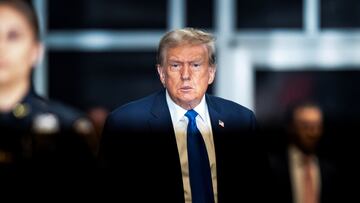This is how the juror selection process for the Donald Trump hush money trial worked
Donald Trump’s New York criminal trial for the ‘Stormy Daniels’ hush money case continues. This is how the jury selection process was carried out.

Donald Trump’s trial for the ‘Stormy Daniels’ case continues. This Thursday, twelve Manhattanites were chosen to serve on the jury in the first criminal trial against a former president of the United States. In addition, six substitutes will be chosen.
In March of last year, Donald Trump became the first president in the country’s history to be indicted. On that occasion, the former president was charged in relation to the ‘Stormy Daniels’ case.
What does the 'Stormy Daniels' case consist of?
According to the case filed by Manhattan District Attorney Alvin Bragg, Michael Cohen, Trump’s former lawyer, made a $130,000 payment to Daniels on behalf of the former president. According to Cohen’s testimony, the payment was to cover up an affair Trump had with Daniels. With the payment it was hoped that the news would not come to light so as not to harm his 2016 presidential candidacy.
On April 4, the former occupant of the White House was arrested after arriving at the Manhattan Criminal Courts, where he surrendered to authorities. In this case, Trump faces 34 charges of “Falsifying business records in the first degree.” The former president pled not guilty.
You may be interested in: How long will Trump’s criminal trial for the ‘hush money’ case last?
This is how the jury was chosen for Donald Trump’s trial
Last week, Judge Juan Merchan, who is overseeing this case of former President Donald Trump, approved a 42-question questionnaire for jury selection, as well as instructions for the potential jurors.
The form included questions on these topics for the potential jury members, who have been chosen from two groups of 96 people so far:
- Their neighborhoods, professions, employers (present and past), marital status, hobbies and interests, and relationships with other people who have been victims of crimes or, alternatively, have worked in places like the FBI or prosecutors' offices or in criminal law.
- If due to “political, moral, intellectual or religious beliefs or opinions” they would not be able to follow the judge's instructions or issue a verdict.
- If you have read any of the books by Mark Pomerantz or Michael Cohen about the alleged crimes and/or the investigation that led to the case and if what they have read or heard through the audiobook would affect their ability to be a fair or impartial person in this case.
- About any personal, family or close friend ties to Trump or the Trump Organization.
- If they practice “a religion that would prevent them from serving on the jury on any particular day or night of the week.”
- What they read, watch and listen to in terms of media consumption, followed by a list of options, including The New York Times, New York Post and The Wall Street Journal, as well as CNN, Fox News, MSNBC and Newsmax, in addition to via any social media platforms such as Facebook, X, TikTok and Truth Social.
As for the process, according to CNN, the judge has asked two broad questions: whether any juror feels they cannot be fair or impartial and whether they cannot participate in the trial for another reason.
Potential jury members will have answered the 42 questions in a questionnaire. Additionally, prosecutors and Trump’s lawyers each have 30 minutes to ask more specific questions of the jurors, after which it is decided whether the jurors are chosen or not.
Both prosecutors and the former president’s legal team receive 10 peremptory challenges that they can use to excuse jurors, also known as strikes. Trump and prosecutors used six strikes on Tuesday, leaving them each with four remaining.
The judge has ordered that the identities of the jurors will be kept confidential during the trial and that journalists will withhold any information that could identify them. Only some characteristics of the jury members have been shared.





